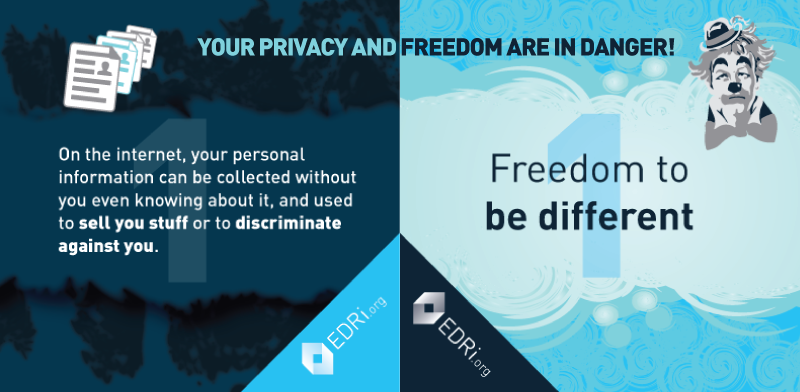#1 Freedom to be different: How to defend yourself against tracking
This is the first blogpost of our series dedicated to privacy, security and freedoms. In the next weeks, we will explain how your freedoms are under threat, and what you can do to fight back.

Cookies: What are they and how do they work?
One of the ways you leave digital traces behind while surfing online are cookies. They are bits of information that get automatically installed into your device while visiting websites. Sometimes they are useful; for example, when shopping online, the website needs to remember what you have added to your shopping basket, so that you can later check out and do the payment.
But most of the times cookies are placed by advertisers that want to collect data about which websites you visit, to target ads at you. This could seem harmless, but it creates risks. For example, when you are categorised (“profiled”) as someone who earns a good salary, you are likely to see higher prices for the things you want to buy. Or on the contrary, if you are profiled as someone who hasn’t got much money, you could end up paying more for your insurance since an insurance company might considered you a “risk”. Online tracking limits your freedom to be different.
How to claim back your freedom to be different
These tools will enable you to wipe most of the digital traces of your browsing activity:
![]()
Install Firefox – a browser that is more secure than others and whose features can be enhanced by numerous add-ons. Start using it now!
Install the following add-ons in your browser:

Privacy Badger: this add-on for your browser puts you back in control by spotting and then blocking third-party domains that seem to be tracking your browsing habits (that is, when advertisers and websites track your browsing activity across the web without your knowledge, control, or consent). Although it blocks many ads in practice, it is more a privacy tool than a strict ad blocker. You can easily download it here.

HTTPS Everywhere: This tool is, again, an add-on for Firefox (both desktop and Android), Chrome, and Opera that makes your browser use HTTPS to encrypt its communication with websites to the greatest extent possible. You can easily download it here.
If you want to find out more tools to defend yourself online, check out the excellent Surveillance Self-defense instructions by the EFF.
John is also dealing with cookies and online tracking in this video, prepared by our member Association for Technology and Internet (ApTI) – Romania:
What can politicians do to safeguard your freedoms online?
The rules on online privacy in the EU (ePrivacy Directive) will be soon updated. This law is dealing with privacy and confidentiality of communications for the entire EU, and it affects tracking and other issues related to your freedoms online. Are politicians ready to fight for your protection?
Stay tuned to our next blogposts to know more about your freedoms online, and how they are threatened!
Read more:
Behavioural Sciences and the Regulation of Privacy on the Internet
http://papers.ssrn.com/sol3/papers.cfm?abstract_id=2513771
Article 29 Working Party: Opinion 04/2012 on Cookie Consent Exemption
http://ec.europa.eu/justice/data-protection/article-29/documentation/opinion-recommendation/files/2012/wp194_en.pdf


